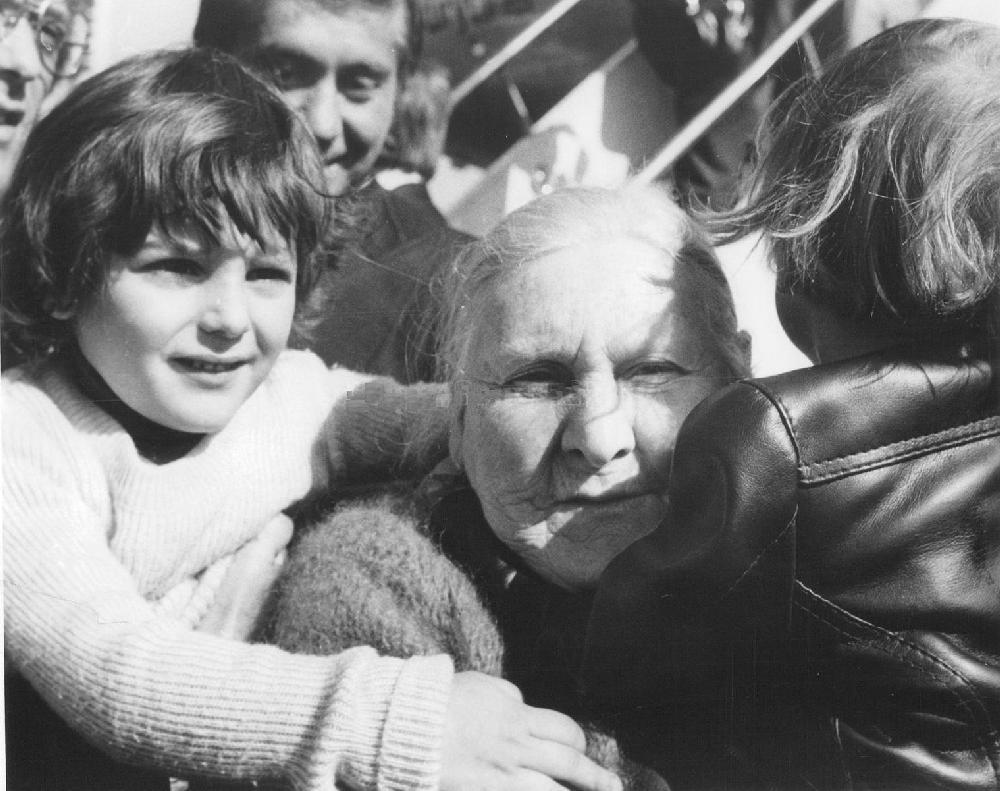
Soviet Jewish Emigrtion: American Congressional Action (1974-75)

Figure 1.--Soviet authorities refused to meet Congressional demands attached to the United States-Soviet Trade Act. Even so, theu began to permoit increased Jewish emigration. Here we see Soviet Jews arriving in Ameica. In his case it was family members being reunited. Shendlaza Kislin is shown as she arrives at Boston's Logan Airport. The children hugging her are her grandchildren. The girl is Regina Kislin. The photograph was dated April 23, 1975.
|
|
The Nixon Administration had favored quiet diplomacy with the Soviets on human rights . Congressional Democrats were of a different mind. Wahington Senator Henry 'Scoop' Jackson wanted to make human rights an integral element in the American-Soviet relationship. He and Ohio Congressman Charles Vanik sponsored an amendment to the United States-Soviet Trade Bill that would make open emigration a part of American foreign policy. The Act was passed by Congress as part of an Amendment to the Trade Act of 1974 (November 1974 and signed into law by President Ford (January 1975). It forced the Administration to include civil rights as part of the bilateral relationship. The Act required the Soviet Union to end restrictions on emigration, both quotas and diploma taxes) if they wanted most faborable trade status. While some saw this as tilting at windmills, we now know more about the Soviet economic decline and that access to the U.S. markey was indeed important to the Soviets. The Soviets at first rejected this as unwaranted interference and refused the trade deals. It would, however, be key to forcing the Soviets to eliminating long-standing barriers to the emigration of Jews whio were now pressing to leave the country. Wilbur Mills, Chairman of the powerful House Ways and Means Committee also supported the bill. The Act required that 'non-market' economy countrie (a way of specifing the Soviet Union without specifically naming them, comply with specific free emigration criteria as a prerequisite for receiving economic benefits in trade relations with the United States. What the Soviets wanted was Most Favored Nation (MFN) status and access to U.S. government financial facilities. And the Act meant that they would have to open up emigration to get these trade benefuts. The Nixoin Adminidtration opposed the Act, seeing it as a threat to its policy of because the Soviets so ardently opposed it. The American Jewish community strongly backed it. The Nixon Administration as part of its détente policy had negotited a comprehensive trade agreement with the Soviets (October 1972). Liberal sentors led by New York Senator Jacob Javits broached the idea of linking trade benefits to Soviet Jewish emigration. Senators Jackson, Abraham Ribicoff, and Hubert Humphrey picked up the issue and begam building a liberal-conservative coalition. The Soviets began to make concessions. At first they offered to make exemptions to the diploma tax and offered to rescind it as the Soviet-American Trade Bill as Congress was about to pass it (1974). It iscat that point that Senator Adlai Stevenson III intervened. He was disturbed by Soviet actions durung the Yom Kippur War (1973). The Soviets had not only armed the Arabs to the hilt, but threatened intervention. He introduced an amendment limiting U.S. credits to only $300 million over 4 years. He also prohibiting U.S. credits for developing Soviet oil and natural gas deposits, in resoonse to Soviet support for the Arab oil embargo. The Soviets who had been thinking of some $40 billion in U.S. credits, repudiated the trade agreement. Even so, they did allow increases in Jewish emigration.
Sources
CIH -- Cold War

Navigate the CIH -- Cold War Section:
[Return to Main Cold War Soviet Jewery page]
[Return to Main Cold War: Phase II page]
[Return to Main Cold War page]
[Return to Main Communism page]
[Return to Main Russian Jewish page]
[About Us]
[Assessment]
[Biogrphies]
[Countries]
[Communism]
[Culture]
[Decolonization]
[Economics]
[Famines]
[Fashion]
[Freedom]
[Hot wars]
[Human rights]
[Inteligence]
[Mass killing]
[Military]
[Pacifism]
[Phases]
[Science]
[Totalitarianism]
[Bibliographies]
[Contributions]
[FAQs]
[Images]
[Links]
[Registration]
[Tools]
[Return to the Cold war Home page]
[Return to the 20th century wars and crises]
Created: 5:02 AM 7/11/2018
Last updated: 5:02 AM 7/11/2018



